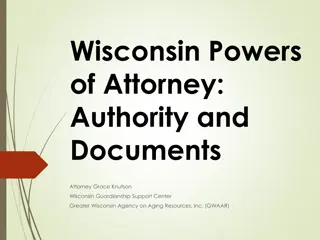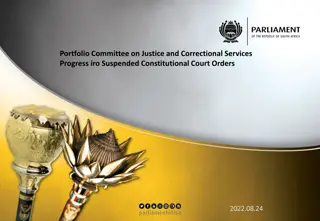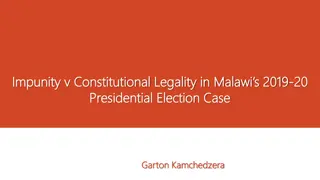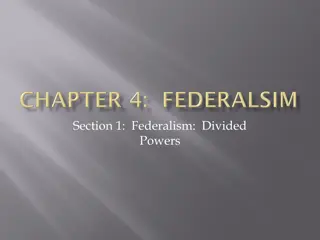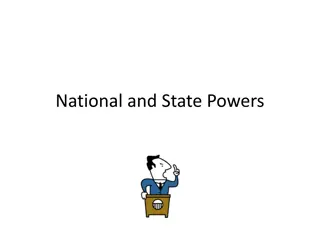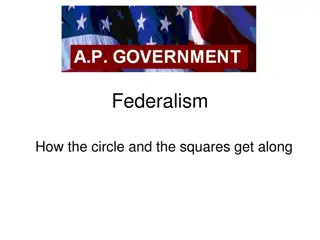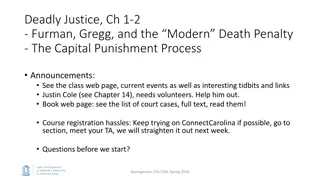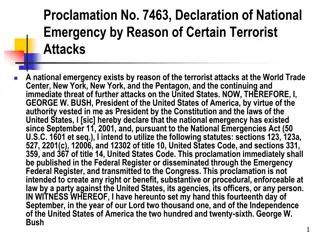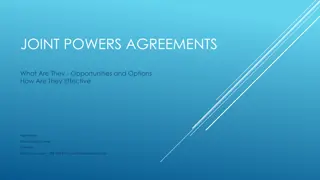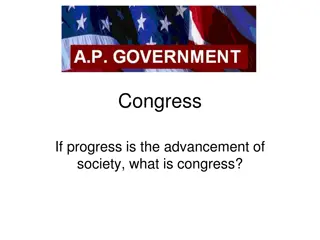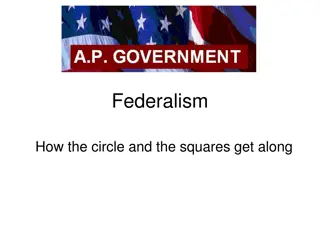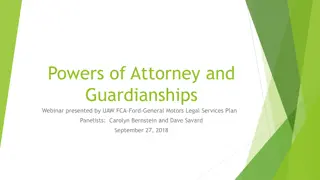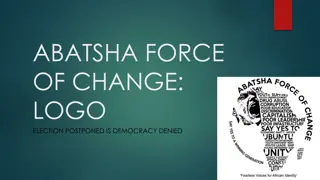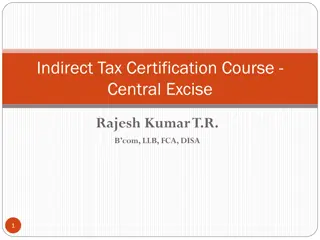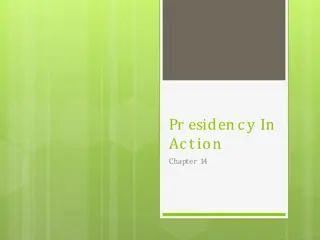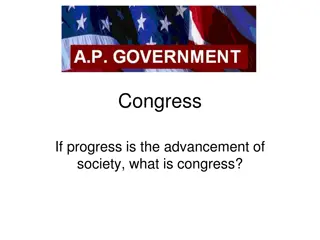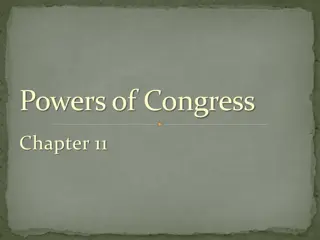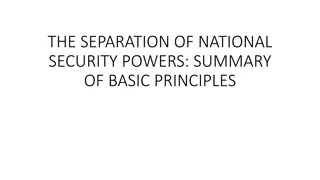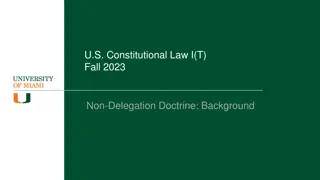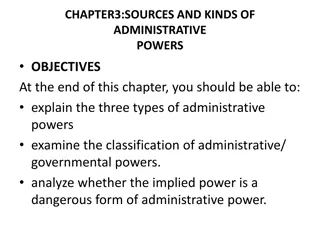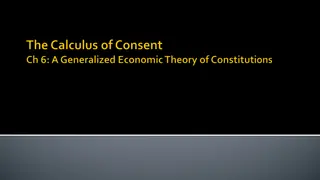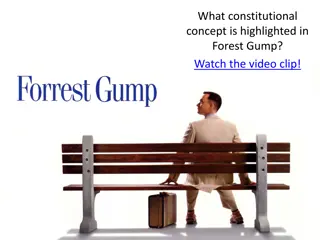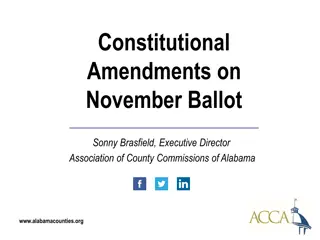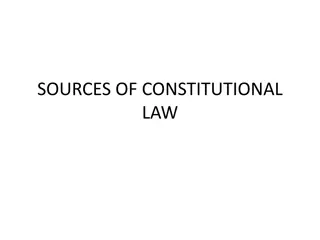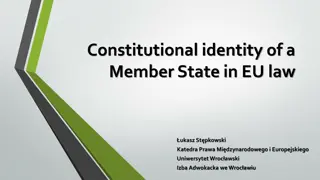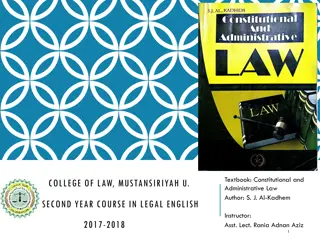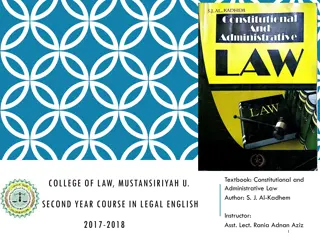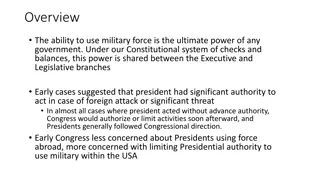READ⚡[PDF]✔ Emerging Space Powers: The New Space Programs of Asia, the Middle Ea
\"COPY LINK HERE ; https:\/\/getpdf.readbooks.link\/B004NNUV54\n\n[READ DOWNLOAD] Emerging Space Powers: The New Space Programs of Asia, the Middle East and South-America (Springer Praxis Books) | Emerging Space Powers: The New Space Programs of Asia, the Middle East and South-America (Springer Pra
1 views • 6 slides
Challenges of Constitutional Reform in Nigeria: A Comprehensive Analysis
Delve into the complexities of Nigeria's constitutional reform efforts since the Fourth Republic began in 1999. Explore the structural, institutional, and historical drivers of constitutional conflict, from a deeply divided society to issues of federalism and ethnic autonomy. Assess the challenges a
0 views • 35 slides
Understanding Separation of Powers in Constitutional Law
Explore the concept of separation of powers in constitutional law, as depicted through the lens of the Diploma in Law program from Malta. Learn about the principles of checks and balances, the relationship between the Executive and the Legislature, and the significance of the rule of law in a democr
0 views • 10 slides
Constitutional Court judgments with suspended orders.
The Constitutional Court in South Africa has issued judgments with suspended orders in various cases relating to Acts that were deemed inconsistent with the Constitution. Orders in cases like the Riotous Assemblies Act and Drugs and Drug Trafficking Act are set to lapse on specific dates unless the
4 views • 44 slides
Understanding Police Powers on the Street Webinar
Explore the powers and procedures of police officers on the street in this informative webinar featuring Sophie Leaver, a Police and Administrative Law Solicitor from Redfern Legal Centre. Topics covered include where police derive their powers, identity requests, personal searches, complaints proce
4 views • 44 slides
Understanding Wisconsin Powers of Attorney: Core Concepts and Types
Explore the essential concepts of powers of attorney in Wisconsin, including self-determination, legal documentation, next of kin laws, and types such as health care and finance powers. Learn about the authority granted to agents and the implications of durable power of attorney.
0 views • 51 slides
Understanding the Constitutional Background of Sparrow Case
Providing a comprehensive contextual understanding of the Sparrow case is crucial beyond just teaching the basic interpretive framework. The historical background of Sparrow, rooted in colonial imperialism and Indigenous sovereignty, shapes the constitutional rationale behind the interpretation of s
0 views • 10 slides
Progress Report on Suspended Constitutional Court Orders - Portfolio Committee Update
Progress report on suspended Constitutional Court orders related to various cases such as Minister of Justice and Constitutional Development v. Prince, Sonke Gender Justice NPC v. President of South Africa, and more. Updates on bills, amendments, and plans presented by the Portfolio Committee on Jus
0 views • 9 slides
Impunity vs. Constitutional Legality in Malawi's 2019 Presidential Election Case
Explore the conflict between impunity and constitutional legality in Malawi's 2019 Presidential Election case. The concept, approach, and argument related to allopoietic law implementation, interpretative inquiry, and rejection of mediocrity are discussed in detail. The battle against impunity and m
0 views • 10 slides
Understanding Federalism: Divided Powers and Constitutional Framework
Federalism is a system where powers are divided between a central government and regional entities. It involves delegated, reserved, exclusive, and concurrent powers outlined in the Constitution. The supremacy of the Constitution is pivotal in establishing a unified federal government.
0 views • 5 slides
Understanding National and State Powers in the United States
The Constitution grants specific powers to the national government, including expressed, implied, and inherent powers. States have reserved powers, and there are concurrent powers shared by both levels of government. The Supremacy Clause ensures that national laws take precedence over state laws. Ex
0 views • 13 slides
Understanding Federalism in the United States
Federalism in the United States involves the relationship between the federal government and state governments, with terms such as delegated powers, reserved powers, concurrent powers, and the Elastic Clause playing key roles. The aftermath of events like Hurricane Katrina and policies such as No Ch
0 views • 30 slides
Evolution of the Death Penalty in the United States
The history of capital punishment in the US, from its early roots in the 17th and 18th centuries to the current constitutional debates surrounding it. The chapters explore landmark court cases and legal interpretations, tracing the evolution of the death penalty and its constitutional implications.
0 views • 26 slides
Understanding National Emergency Declarations and Emergency Powers Laws
This content delves into the legal aspects of national emergency declarations, emergency powers laws, and judicial review of emergency declarations. It covers the purpose, termination, historical context, congressional oversight, and impact on presidential powers. It also explores the complexities o
0 views • 6 slides
Understanding Joint Powers Agreements: Opportunities, Options, and Effectiveness
Joint Powers Agreements (JPAs) enable public agencies to collaborate efficiently, providing services and facilities in line with various factors. Idaho Code outlines the purposes, definitions, and powers that can be jointly exercised. This legal framework facilitates cooperation among entities, alth
0 views • 34 slides
Understanding Moral and Constitutional Values in Relation to Judiciary
Explore the concepts of moral values and constitutional values, emphasizing their importance in decision-making processes and societal norms. Discover the stages of moral development and delve into constitutional values such as sovereignty, socialism, secularism, democracy, justice, liberty, equalit
0 views • 9 slides
Classroom Guidelines for Lesson on Properties of Exponents
Follow the classroom guidelines for this lesson on Properties of Exponents. Learn about the rules of exponents, how to simplify expressions, and complete bell work matching equations with properties. Homework includes worksheets on horse-breeding and dog eating table scraps. Understand product, quot
0 views • 10 slides
Understanding the Role and Structure of Congress in the US Government
Congress, as the legislative branch of the US government, plays a vital role in advancing society by making laws and representing the interests of the American people. Founded with intentions to balance powers and represent states of different sizes, Congress is divided into the House of Representat
0 views • 32 slides
Creating State Constitutions in Revolutionary America
After declaring independence from British rule in 1776, the American colonies embarked on forming new state governments. The focus was on protecting natural rights, establishing a republican form of government, and implementing limitations on governmental powers through constitutional frameworks. Th
0 views • 19 slides
Understanding Federalism: Powers, Relationships, and Key Terms
Explore the concept of Federalism through the relationship between the federal government (circle) and state governments (squares). Discover the powers involved such as Delegated, Reserved, Concurrent, and Prohibited powers. Delve into significant cases like McCulloch v. Maryland, terms like the Ela
0 views • 28 slides
Understanding Powers of Attorney and Guardianships Presentation
This presentation covers important aspects of Powers of Attorney and Guardianships, including types of powers of attorneys, when they are needed, who should be given power of attorney, responsibilities if named as an attorney, and considerations regarding revocation. It also discusses the need for g
0 views • 11 slides
Understanding Postponement of Elections in a Constitutional Democracy
Abatsha Force of Change (AFC) movement, a non-profit organization in South Africa, aims to empower African youth for social change. With a focus on democracy and constitutional rights, the movement discusses the legal implications of election postponements within the country's governance framework.
0 views • 21 slides
Understanding Indirect Taxation in India: Insights and Constitutional Aspects
Delve into the world of indirect taxation in India through an exploration of revenue streams, budget estimates, tax structures, and constitutional aspects. Discover how Parliament and State Legislatures have exclusive powers to make tax laws, in accordance with Article 265 of the Constitution of Ind
0 views • 88 slides
Understanding Presidential Powers in the United States
The content discusses various powers of the President of the United States, including oath of office, executive orders, appointment power, removal power, diplomatic and military powers, treaties and agreements, commander-in-chief role, and legislative and judicial powers. It covers aspects like maki
0 views • 12 slides
Evolution of Human Rights Protection in the EU
The journey of human rights protection in the EU, from the absence of explicit rules to the affirmation of fundamental rights by the CJEU, influenced by case law and the evolution from judicial to codified protection. National courts' concerns on ensuring consistency with constitutional values led t
0 views • 9 slides
Understanding the Role and Function of the U.S. Congress
U.S. Congress plays a crucial role in advancing society by making laws, overseeing the budget, and conducting investigations. This article explores the structure, powers, and leadership of Congress, detailing the differences between the House and Senate and explaining the Constitutional and evolutio
0 views • 31 slides
Powers of Congress: Legislative, Implied, and Congressional Powers Explained
Explore the various powers of Congress, including legislative powers such as enumerated and implied powers, as well as congressional powers like regulating commerce and funding the government through taxes. Discover how Congress exercises authority granted by the Constitution to fulfill its roles an
0 views • 23 slides
Powers of Congress and Constitutional Framework
The powers of Congress in the United States are shaped and limited by two fundamental facts: limited government and a federal system. The Constitution grants Congress powers through expressed, implied, and inherent powers. The Congressional view of power varies between strict constructionists and li
0 views • 25 slides
Understanding the Separation of National Security Powers
The separation of national security powers involves the formalist view where Congress makes laws, the Executive executes them, and the courts interpret them. The branches' powers are often blurred, with Congress able to delegate lawmaking power to the Executive. The Executive can also acquire custom
0 views • 8 slides
U.S. Constitutional Law I(T) Fall 2023: Non-Delegation Doctrine Overview
Exploring the Non-Delegation Doctrine in U.S. Constitutional Law, this content delves into the background, current doctrine, historical cases, and contextual considerations related to congressional delegation of regulatory powers. It addresses the constitutionality of Congress authorizing bodies suc
0 views • 46 slides
Understanding Administrative Powers and Objectives
Explore the sources and types of administrative powers, including express, implied, and incidental powers. Delve into the classification of governmental powers and evaluate the implications of implied powers. Gain insights into how constitutional provisions and delegated legislation contribute to th
0 views • 16 slides
Decision Making and Constitutional Rules Behind the Veil of Ignorance
In decision-making for collective actions, individuals behind a veil of ignorance need constitutional rules to govern future decisions. The choice of rules, the expected external costs, and decision-making costs play a crucial role in determining the optimal decision-making rule. By minimizing total
0 views • 16 slides
Understanding Federalism in the US Constitution
Forest Gump showcases the conflict between state and federal powers, exemplified by Governor George Wallace's refusal to desegregate the University of Alabama. The scenario underscores the concept of federalism, which isn't explicitly stated in the Constitution but is evident in the division of powe
0 views • 18 slides
Constitutional Allocation of Powers and National Security
The legal battles discussed delve into the intricacies of constitutional powers, public scrutiny, and national security. From examining the conflict between branches to analyzing the authority of the Commander in Chief, this content offers insights into the delicate balance of governmental roles and
0 views • 37 slides
Alabama County Constitutional Amendments and Administrative Decision-Making Overview
Explore the Alabama Constitutional Revision Commission's recommendations for four ballot initiatives in November. Learn about county-recommended amendments and the Administrative Decision-Making Act, granting limited administrative powers to county commissions. The act focuses on specific areas whil
0 views • 12 slides
Understanding the Sources of Constitutional Law
Explore the various sources of constitutional law, including legal basis, formal sources of law, values influencing norms, and the role of jurisprudence. Delve into concepts like Hans Kelsen's method of creating law, the origin of constitutional law, and the factors influencing it. Discover how diff
0 views • 11 slides
Constitutional Identity in EU Law: Evolution and Interpretation
Exploring the concept of constitutional identity within EU law, this article delves into the evolution of this principle from the Treaty of Maastricht to the current Treaty structures. It highlights the notion of respecting national identities and essential state functions, emphasizing the importanc
0 views • 13 slides
Constitutional and Administrative Law Course at College of Law, Mustansiriyah University
Second-year students at the College of Law, Mustansiriyah University, are studying Constitutional and Administrative Law for the academic year 2017-2018. The course covers topics such as the sources of Constitutional Law, including Legislation, Judicial Interpretation, and Conventions. Asst. Lect. R
0 views • 6 slides
Understanding Constitutional and Administrative Law at Mustansiriyah University
Explore the fundamental concepts of Constitutional Law through the course at Mustansiriyah University's College of Law. Delve into the nature of constitutional rules, the essence of constitutional law, and the universal characteristics of constitutions. Understand how constitutional rules reflect th
0 views • 6 slides
Constitutional War Powers in the United States
The use of military force is a crucial power of the government, shared between the Executive and Legislative branches under the Constitution. Congress holds the War Power, granting authority to declare war, raise armies, and regulate forces, while the President serves as the Commander-in-Chief. The
0 views • 11 slides
![READ⚡[PDF]✔ Emerging Space Powers: The New Space Programs of Asia, the Middle Ea](/thumb/21554/read-pdf-emerging-space-powers-the-new-space-programs-of-asia-the-middle-ea.jpg)




